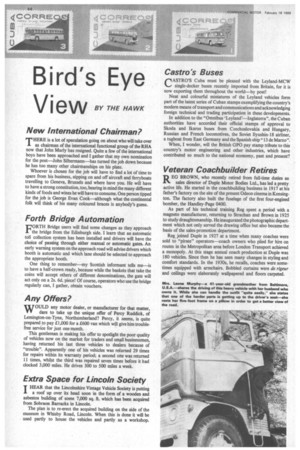Bird's Eye
Page 46

If you've noticed an error in this article please click here to report it so we can fix it.
ViewBY THE HAWK
New International Chairman?
THERE is a lot of speculation going on about who will take over as chairman of the international functional group of the RHA now that John Murly has resigned. Quite a few of the international boys have been approached and I gather that my own nomination for the post—John Silbermann—has turned the job down because he has too many other chairmanships on his plate. Whoever is chosen for the job will have to find a lot of time to spare from his business, nipping on and off aircraft and ferryboats travelling to Geneva, Brussels and where have you. He will have to have a strong constitution, too. bearing in mind the many different kinds of foods and wines he will have to consume. One person tipped for the job is George Evan Cook—although what the continental folk will think of his many coloured braces is anybody's guess.
Forth Bridge Automation
EIORTH Bridge users will find some changes as they approach the bridge from the Edinburgh side. I learn that an automatic toll collection system has been installed and drivers will have the choice of passing through either manual or automatic gates. An early warning system on the approach road will advise drivers which booth is automatic and which lane should be selected to approach the appropriate booth. One thing to remember—my Scottish informant tells me—is to have a half-crown ready, because while the baskets that take the coins will accept others of different denominations, the gate will act only on a 2s. 6d. piece! Of course, operators who use the bridge regularly can, I gather, obtain vouchers.
Any Offers?
WOULD any motor dealer, or manufacturer for that matter, dare to take up the unique offer of Percy Ruddick, of Lemington-on-Tyne, Northumberland? Percy, it seems, is quite prepared to pay £1,000 for a £600 van which will give him troublefree service for just one month. This gentleman is making his offer to spotlight the poor quality of vehicles now on the market for traders and small businessmen, having returned his last three vehicles to dealers because of "trouble". Apparently one of his vehicles was returned 29 times for repairs within its warranty period; a second one was returned 11 times, whilst the third was repaired seven times before it had clocked 3,000 miles. He drives 300 to 500 miles a week.
Extra Space for Lincoln Society
T HEAR that the Lincolnshire Vintage Vehicle Society is putting a roof up over its head soon in the form of a wooden and asbestos building of some 7,000 sq. ft. which has been acquired from Sobraon Barracks in Lincoln.
The plan is to re-erect the acquired building on the side of the museum in Whisby Road, Lincoln. When this is done it will be used partly to house the vehicles and partly as a workshop.
Castro's Buses
CASTRO'S Cuba must be pleased with the Leyland-MCW single-decker buses recently imported from Britain, for it is now exporting them throughout the world—by post! Neat and colourful miniatures of the Leyland vehicles form part of the latest series of Cuban stamps exemplifying the country's modern means of transport and communications and acknowledging foreign technical and trading participation in these developments. In addition to the "Omnibus `Leyland'—Inglaterra", the Cuban authorities have accorded their official stamps of approval to Skoda and Ikarus buses from Czechoslovakia and Hungary, Russian and French locomotives, the Soviet Ilyushin-18 airliner, a tugboat from East Germany and the Spanish ship "13 de Marzo". When, I wonder, will the British GPO pay stamp tribute to this country's motor engineering and other industries, which have contributed so much to the national economy, past and present?
Veteran Coachbuilder Retires
REG BROWN, who recently retired from full-time duties as sales director of Duple Motor Bodies Ltd., has led a pretty active life. He started in the coachbuilding business in 1917 at his father's factory on the site of the present Odeon cinema in Kensington. The factory also built the fuselage of the first four-engine& bomber, the Handley-Page 0400. As part of his technical training Reg spent a period with a magneto manufacturer, returning to Strachan and Brown in 1925 to study draughtsmanship. He inaugurated the photographic department which not only served the drawing office but also became the basis of the sales-promotion department. Reg joined Duple in 1927 at a time when many coaches were sold to "pirate" operators—coach owners who plied for hire on routes in the Metropolitan area before London Transport achieved a monopoly. At this stage annual coach production at Duple was 180 vehicles. Since then he has seen many changes in styling and comfort standards. In the 1930s, he recalls, coaches were sometimes equipped with armchairs. Bobbled curtains were de rigeur and ceilings were elaborately wallpapered and floors carpeted.




















































































































